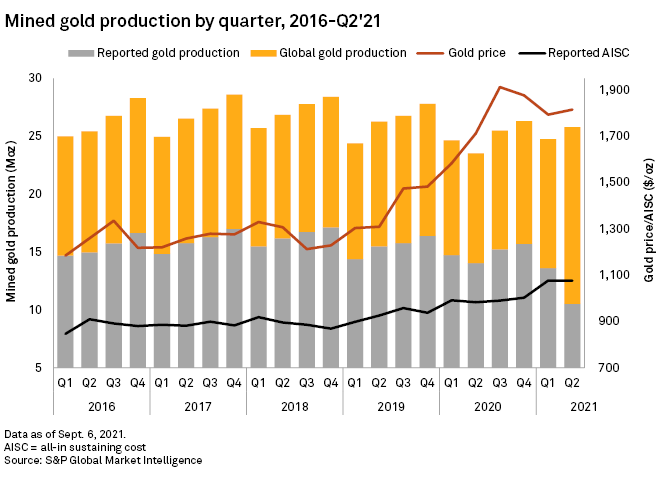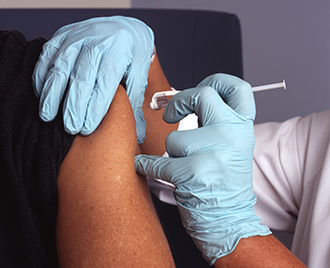S&P Global Offerings
Featured Topics
Featured Products
Events
S&P Global Offerings
Featured Topics
Featured Products
Events
S&P Global Offerings
Featured Topics
Featured Products
Events
Banking & Capital Markets
Economy & Finance
Energy Transition & Sustainability
Technology & Innovation
Podcasts & Newsletters
Banking & Capital Markets
Economy & Finance
Energy Transition & Sustainability
Technology & Innovation
Podcasts & Newsletters
S&P Global Offerings
Featured Topics
Featured Products
Events
8 Oct, 2021

|
A healthcare professional conducts COVID-19 vaccine research in a laboratory. Mining companies have been keeping a close eye on vaccine requirements as the sector recovers from widespread shutdowns in 2020. |
Miners are eyeing COVID-19 vaccine requirements as they reap the success of their earlier mitigation measures, especially in the wake of BHP Group's Oct. 7 adopters to set a mandate for its Western Australia operations.
Miners saw production rebounds after the widespread disruptions of 2020, thanks in part to their implementation of rapid testing, social distancing and quarantining. As they look to build on that success while also slashing pandemic-related costs, mandatory vaccination policies are increasingly under consideration.
The first wave of the pandemic led to mine closures and a rapid drop in metals production in 2020 as the global economy shut down and workers went home sick. But mining companies have since implemented mitigation measures, helping lead to a production rebound in the second quarter of 2021 in some of the hardest hit sectors.
According to a recent S&P Global Market Intelligence analysis, mined gold production jumped 9.7% year over year in the second quarter, reflecting the impact of mine shutdowns last year during the initial months of the pandemic as governments grappled to get a hold on the virus's spread. Market Intelligence analysts also said they expect global mined gold production in 2021 to climb 5.9% to 105.9 million ounces.
In a similar vein, copper output during the first seven months of 2021 rose 2.1% year over year, according to a Market Intelligence report, with analysts estimating a rise in 2021 copper supply to 26.4 million tonnes up from 25.0 million tonnes in 2020.
Mining executives credit COVID-19 health and safety measures, while also underscoring further measures such as vaccinations, as key to controlling the virus at operations and a means to ending some of the more costly COVID-19 protocols.
"That's limited the spread and allows you to get back to some semblance of normality," said Erdene Resource Development Corp. President and CEO Peter Akerley, who recently returned from a business trip in Mongolia, where COVID-19 cases recently spiked. "The flip side of this is everybody is realizing, particularly in countries like Mongolia, that we have to accept this as the new norm and find ways to live with it."

To vax or not to vax
Across the sector globally, mining companies are considering mandatory vaccination policies, and mining giant BHP has taken the plunge.
"In line with government guidance, we recognize the path forward is through widespread vaccination in Australia and we are looking at a range of practical ways to support that while protecting communities and workforces," BHP Minerals Australia President Edgar Basto said in a statement.
Most other companies so far have encouraged workers to get the jab rather than require it, though that may soon change. Precious-metals miner Sibanye Stillwater Ltd. and diversified-miner Teck Resources Ltd. told Market Intelligence they are assessing it as a strategy.
"We are aware of the rights of our employees to make choices about their health, but need to weigh that up against ensuring the rights of the majority of our employees to work in a safe and healthy work environment," James Wellsted, a senior vice-president with Sibanye Stillwater, said in an email.
 |
| Mining executives consider vaccinations as key to reducing COVID-19-related costs. Source: National Cancer Institute |
Such policies may be critical for miners that want to ease up on other health and safety protocols. Indeed, Wellsted tied vaccinations to reducing COVID-19-related costs that have come from social distancing, testing regimes and thorny travel restrictions, among other measures, at mines around the world.
"Clearly this would only really be feasible if our entire workforce was vaccinated," Wellsted said.
But as the prospect of mandatory vaccinations comes to the fore, the conversation remains fraught, caught up in issues over human and worker rights. Vaccination requirements will vary from country to country and company to company.
"It's going to be highly jurisdictional," Cormark Securities analyst Stefan Ioannou said in an interview, noting that mandatory vaccinations policies will face extra scrutiny, and possible opposition, from some unions operating in mining regions such as Chile and Canada.
Taking a similar view, Ben Chalmers, vice-president of the Mining Association of Canada, said unions will play a central role in how far or how quickly mining companies can push vaccine mandates.
"It's so different than the previous waves because we have the vaccines and vaccine passports are rolling out," Chalmers said in an interview. "But the delta variant is spreading more easily and it's certainly raising a lot of questions in terms of how we proceed."
Costs of COVID-19 measures likely to persist
Still, the latest wave of cases has dented the case for a quick exit from COVID-19 and could mean pandemic-related costs persist for the near future, analysts said.
"I don't think these additional COVID-19 costs are going away any time soon," said Haywood Securities analyst Kerry Smith in an email.
But there may also be a silver lining for the industry in how the pandemic wrought changes to operations, said Franco-Nevada Corp. Chairman David Harquail.
"If anything, I am optimistic that COVID-19 has accelerated a more fundamental reexamination of business practices, leading to more [general and administrative] efficiencies," Harquail said, pointing to the widespread adoption of virtual meetings and work-from-home policies, a move to smaller head offices and a decrease in the need to travel.
"The real value from this is less the savings, but rather [in having] fewer distractions from running operations," Harquail said.
